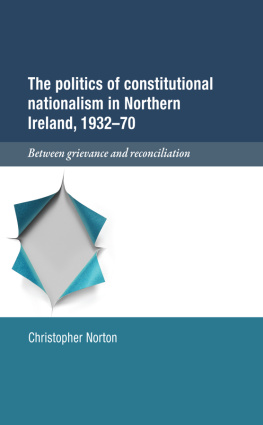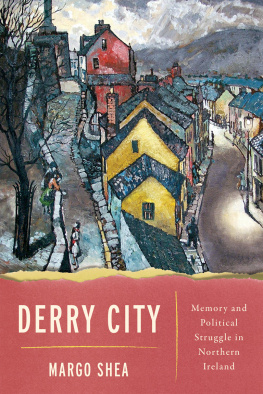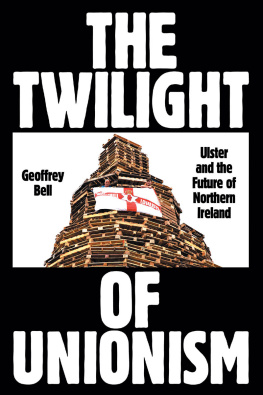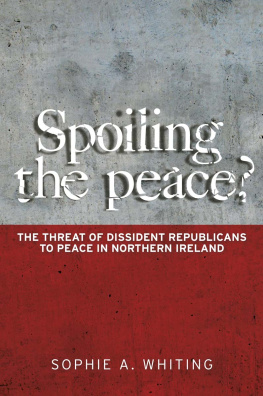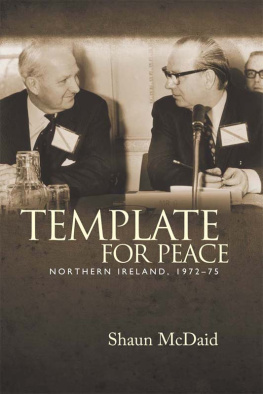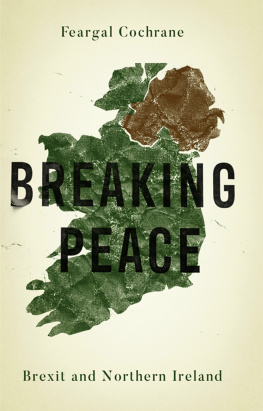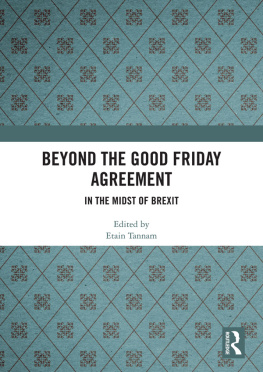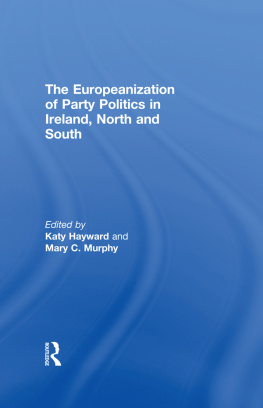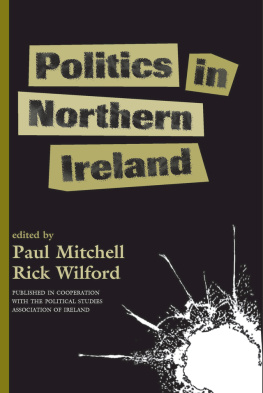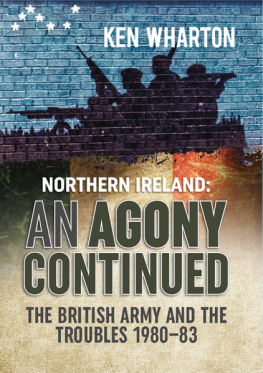The politics of constitutional
nationalism in Northern Ireland,
193270
For Francesca and Patrick
The politics of constitutional
nationalism in
Northern Ireland, 193270
Between grievance and reconciliation
Christopher Norton
Manchester University Press
Manchester and New York
distributed in the United States exclusively
by Palgrave Macmillan
Copyright Christopher Norton 2014
The right of Christopher Norton to be identified as the author of this work has been asserted by him in accordance with the Copyright, Designs and Patents Act 1988.
Published by Manchester University Press
Oxford Road, Manchester M13 9NR, UK
and Room 400, 175 Fifth Avenue, New York, NY 10010, USA
www.manchesteruniversitypress.co.uk
Distributed in the United States exclusively by
Palgrave Macmillan, 175 Fifth Avenue, New York,
NY 10010, USA
Distributed in Canada exclusively by
UBC Press, University of British Columbia, 2029 West Mall, Vancouver, BC, Canada V6T 1Z2
British Library Cataloguing-in-Publication Data
A catalogue record for this book is available from the British Library
Library of Congress Cataloging-in-Publication Data applied for
ISBN 978 0 7190 5903 2 hardback
First published 2014
The publisher has no responsibility for the persistence or accuracy of URLs for any external or third-party internet websites referred to in this book, and does not guarantee that any content on such websites is, or will remain, accurate or appropriate.
Edited and typeset
by Frances Hackeson Freelance Publishing Services, Brinscall, Lancs
Contents
I am particularly indebted to my colleagues Michael Cunningham, Eamonn OKane and Hildegard Norton-Uhl who were generous enough to read earlier drafts of this book and whose comments and suggestions proved immensely helpful. In this regard my thanks also go to Manchester University Presss anonymous reader. My good friend, Francis McCaffrey, originally put the idea of writing this book into my head and has maintained a supportive and encouraging interest in its development ever since. Much welcome hospitality and friendship was provided by Paul and Jane McGowan in Belfast. I would like to thank the staff of the Public Record Office of Northern Ireland, the National Archive of Ireland and the Linen Hall Library, Belfast for their courteous help. The staff of Manchester University Press have shown great patience and professionalism for which I am extremely grateful.
Finally, my warmest thanks go to my children Francesca and Patrick for their support, good humour and the sheer joy of their company.
| DEA | Department of External Affairs |
| FOI | Friends of Ireland |
| GAA | Gaelic Athletic Association |
| IAPL | Irish Anti-Partition League |
| IRA | Irish Republican Army |
| IrLP | Irish Labour Party |
| IUA | Irish Union Association |
| LDF | Local Defence Force |
| NCU | National Council for Unity |
| NDP | National Democratic Party |
| NICRA | Northern Ireland Civil Rights Association |
| NILP | Northern Ireland Labour Party |
| NPF | National Political Front |
| NU | National Unity |
| RLP | Republican Labour Party |
| RUC | Royal Ulster Constabulary |
| S-CMA | Six-Counties Mens Association |
| SDLP | Social Democratic and Labour Party |
| UUC | Ulster Union Club |
| UVF | Ulster Volunteer Force |
This book considers the constitutional nationalist tradition in Northern Ireland, its articulation and representation of Catholic interests, and the political outcomes and consequences of its attempts to achieve its goal of Irish unity by constitutional and peaceful political means. It is a work that focuses on the strategic considerations and decisions of constitutional nationalist political leaders, activists and political organisations in the years 193270. As such it does not rehearse the Catholic experience of discrimination and disadvantage in Northern Ireland during this period; an area already well documented and subject to serious and balanced scholarly enquiry.
To set the historical background of this study let us turn to the question of strategy and strategic considerations prior to 1932. In 1921 some 430,000 northern Catholics Ulster unionist resistance against inclusion into a Home Rule Ireland without their consent was resolute. In September 1912, in a significant display of constitutional militancy, a quarter of a million people signed the Ulster Covenant solemnly pledging their opposition to Home Rule. More ominously, in 1913, the formation of the Ulster Volunteer Force, a 100,000-strong militia and the consequent establishment of an Irish nationalist militia (the National Volunteers) signalled a dangerous militarisation of politics in Ireland. As the Home Rule Bill continued its stormy passage through both Houses of Parliament, events in Ireland, particularly the arming of the respective militias in 1914, revealed that the prospects of reconciling the divergent aspirations of Irish nationalism and Ulster unionism were becoming ever more remote, and the probability of some form of exclusion from Home Rule for part of the northern province of Ulster, where most Protestant unionists were located, ever more likely.
The question now arose as to what shape or form such exclusion would take: how many counties in Ulster were to be potentially excluded from Home Rule and would such exclusion be a temporary expedient or a permanent fixture? This was clearly an issue that fixed the minds of Catholics in the eastern Ulster counties who were faced with the prospect of permanent minority status. Redmond, politically and temperamentally inclined to seek an accommodation rather than a confrontation with Ulster unionists, proposed the temporary exclusion of those Ulster counties with Protestant majorities as a compromise, and his northern lieutenant, the West Belfast MP Joe Devlin, while at first hostile to this proposal, gradually came to accept the necessity of a conciliation strategy. For their part, and in an attempt to assuage unionist fears, the government introduced an amendment to the Home Rule Bill, in March 1914, which facilitated the temporary exclusion of Ulster counties (for a period of six years) by enabling each county to vote itself in or out of the Home Rule settlement. This proposal was rejected as unacceptable by the Ulster Unionist leader Sir Edward Carson who insisted on the permanent exclusion of six north-eastern Ulster counties. By the time the Home Rule Bill received royal assent, in September 1914, a compromise between the two sides had not been reached.
The mounting sense of crisis in Ireland was, at this point, temporarily suspended by Britains entry into World War I and by the governments decision to delay the implementation of Home Rule until wars end. Both Redmond
Constitutional nationalism in the north-east may have shown itself to be politically robust, but as Sinn Fin carried out its abstentionist programme withdrawing from Westminster in early 1919 to convene a parliament of the Irish Republic in Dublin Devlin found himself in the unenviable position of leading a tiny and inchoate Irish Party presence at Westminster. The Irish Party had earlier entertained hopes that, in the event of an exclusion settlement for Ulster, a safeguard for northern nationalists would be provided by the dual pressure of an Irish Home Rule parliament within the UK and the continued influence of Irish MPs sitting at Westminster. These hopes were now dashed.

